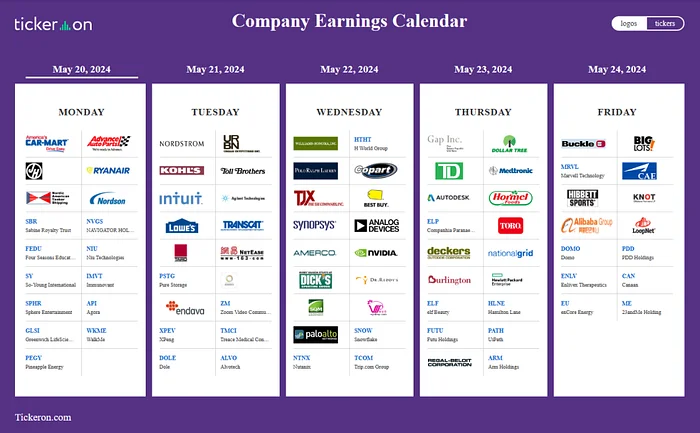Can AI Really Write Like a Human? Let's Quantify the Mess. The promise of A...
2025-11-04 10 earnings calendar
Forget the stock tickers and the decimal points of earnings-per-share estimates for a moment. I know, I know. The financial world is buzzing this week, a symphony of ringing bells and frantic analyst calls. We’re about to see earnings reports from a parade of giants: Microsoft, Apple, Meta, Amazon. On the surface, it’s a quarterly ritual, a financial stress test for corporate America.
But what if I told you this week is something more?
What if this isn’t just about the markets, but about a live, real-time diagnostic of the future we are building, right now? For the next few days, we’re not just getting financial data; we’re getting a high-resolution snapshot of the entire engine of human progress, from the most esoteric lines of code in the cloud to the very steel holding up our bridges. And when I look at the list of companies reporting, I don’t just see logos and ticker symbols. Honestly, it gives me a profound sense of awe at the complexity and the sheer, breathtaking potential of the machine we've all built.
This is the kind of week that reminds me why I got into this field in the first place. It’s a chance to look under the hood. So, let’s do it together.
First, you have the titans. The names that have become verbs, the companies that are less like corporations and more like digital nation-states. Apple, Microsoft, Amazon, Meta. Their quarterly reports are the modern equivalent of a papal encyclical—documents that will be dissected not just for their financial health, but for the clues they hold about the direction of our civilization.
Think about it. We're not just asking if Apple sold enough iPhones. We're asking: is the portal through which billions of people experience reality still the most desired object on the planet? Is our primary interface with the digital world still accelerating? When Amazon reports, we're not just looking at e-commerce sales. We’re examining the health of Amazon Web Services, the foundational utility of the 21st century. It's like asking about the state of the electrical grid in 1930. The question isn't just whether the power company is profitable, but whether the very foundation for a new industrial revolution is strong, growing, and ready for what’s next.
And then there’s Microsoft and Meta, battling over the very nature of our future work and social lives. This isn’t about software licenses or ad revenue anymore. It’s a referendum on two competing visions for human interaction. Will our future be one of collaborative, AI-infused productivity, or one of immersive, virtual connection? Their earnings are a proxy vote, cast in billions of dollars, on where we’re headed. We’re talking about the cloud infrastructure that powers our entire digital lives, the AI models that are beginning to think in ways we can barely understand, and the consumer hardware that acts as the portal to this new world—it's a convergence of forces so massive and moving so fast it's almost impossible to track from the ground.

This is where we have to ask the bigger questions. Are these architects just building taller skyscrapers on the same old ground, or are they laying the foundations for entirely new cities? Is this staggering wealth and power translating into genuine human progress, or just more refined ways to capture our attention and data?
As dazzling as the digital world is, it’s a ghost. It’s an illusion of light and logic that relies, completely, on a physical world of atoms, sweat, and steel. And that’s what makes this week’s earnings so uniquely fascinating. It’s not just the tech giants reporting; it’s the companies that represent the ground truth.
The tech world is like the stunning, glass-walled penthouse of a skyscraper, with breathtaking views of the future. But this week, we also get to inspect the building’s foundation. We get reports from companies like Nucor, the largest steelmaker in the US. You can’t build data centers, gigafactories, or next-generation infrastructure without steel. Their report is a direct measure of our commitment to building the physical future, not just dreaming about the virtual one.
Then you have Waste Management. It sounds mundane, but they are what analysts call a macro barometer—in other words, they give us a brutally honest look at the real-world economy. When we build more, manufacture more, and consume more, they have more to haul away. Their business is a direct reflection of our industrial metabolism. Is it speeding up or slowing down? The answer tells us whether the penthouse has a solid foundation or is sitting on shaky ground.
And what about Whirlpool? A company that makes washing machines and refrigerators. It might seem small next to a trillion-dollar tech behemoth, but it’s an incredibly intimate signal. The decision to buy a major appliance is a vote of confidence in your own personal future. It’s a bet that tomorrow will be stable enough to warrant a major purchase today. It’s the quiet hum of the economy, the pulse of the consumer.
This is the beautiful, messy, interconnected reality. The most advanced AI in the world runs on a server rack made of steel, housed in a building that produces waste, and is ultimately paid for by a populace confident enough to buy a new dishwasher. For progress to be real, the entire system has to work. The penthouse can’t float without the foundation. And this week, we get to see the blueprints for it all. We get to see if the whole, magnificent, terrifyingly complex structure is sound.
So, no, this isn't just another week on Wall Street. It’s bigger than that. It’s a rare moment where we get to see the interconnectedness of everything, the intricate dance between our digital aspirations and our physical realities. The numbers that will be released are more than just financial metrics; they are signals from the future. They are the early tremors of the next paradigm shift, the quiet validation of a thousand brilliant ideas, and the raw data that will shape the world our children inherit. Let's watch, let's learn, and let's get ready to build what comes next.
Tags: earnings calendar
Related Articles

Can AI Really Write Like a Human? Let's Quantify the Mess. The promise of A...
2025-11-04 10 earnings calendar